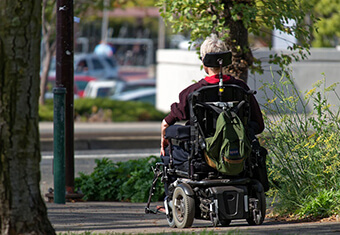Until a disabled child reaches the age of 18, parents (in most cases) will have parental responsibility for their child and, therefore, can make most decisions for them. However, once a child reaches 18 the legal position on decision making changes. Parents lose parental responsibility and no longer have any legal responsibilities or automatic rights to make decisions about their child.
In England and Wales, the starting point for a disabled individual and/or their parent to consider, with regards to decision making, is to assess each decision separately and establish whether your child is able to make this decision for themselves. This is a key principle of the Mental Capacity Act 2005 and it must be assumed that everyone has the capacity to make a decision for themselves unless it can be shown that they lack the mental capacity to do so.
If it is clear that your child isn’t able to make a particular decision, then the decision must be taken on their behalf and the Mental Capacity Act sets out how this must be done. The process will depend on the type of decision to be made.
Health and welfare decisions
Probably the most important type of decisions for your disabled child are those dealing with their health and welfare, for example medical treatment; where to live; what care is given; etc.
The person making the decision may vary depending on the type of decision required. It could be a carer, a health professional, a social worker or a parent. This person must consider a number of factors before the decision is made and the Mental Capacity Act states that any decision must be made in the child’s ‘best interests’.
It’s important to have a good understanding of the Mental Capacity Act and how the decision-making process should work when a decision needs to be made. Any person making a decision for your child should consider whether it is appropriate to consult others, including you as parents, for your views on what is in your child’s best interests.
If there is a dispute in the decision-making process, then attempts should be made to resolve these. It might be necessary to obtain a second opinion on a particular matter, or hold a ‘best interests’ meeting or conference with the relevant parties.
How does the Court of Protection fit in?
The Court of Protection has the power to make decisions on behalf of a person who lacks the mental capacity to make their own decisions or they can appoint a deputy who is given specific powers to make decisions on behalf of that person.
For most decisions that need making, following the Mental Capacity Act will enable decisions to be taken in the best interests of your child. It is generally considered a last resort to apply to the Court.
The type of application made will vary depending on the circumstances at the time. The Court could be asked to make a decision about a particular matter, such as what treatment they should or shouldn’t receive. The Court can also be asked to appoint a deputy who will have certain powers to make decisions on your child’s behalf for a specific period of time.
In some situations, an emergency application can be made to the Court if a decision is required urgently and there is a risk of harm or loss to an individual.
Financial decisions
It is also important to think about what financial matters your disabled child may need help with. What assets do they have in their name? What income do they receive?
If your child is receiving benefits, then you should check with the Department for Work and Pensions if you are the appointee and, therefore, are the person responsible for managing these.
Any organisations where your child has assets may not allow you to manage those assets once your child is 18. For example, banks will require your child to take control of their account and they usually only accept instructions directly from the account holder.
If your child does not have the mental capacity to manage these assets, then you can apply to the Court of Protection to become their deputy for financial matters.
Any application for a deputyship will be considered by the Court and, if approved, they will issue a Deputy Order appointing the deputy and setting out what the deputy can and can’t do. The Deputy Order will then give you the necessary legal authority to manage your child’s financial affairs.
Who can help?
If you have any queries or concerns about how to make decisions for your disabled child, you should speak to a qualified professional, who will be able to advise on the best course for you and your family.
Katherine Miller TEP is a Director and Solicitor at Renaissance Legal
 UK
UK  Canada
Canada


